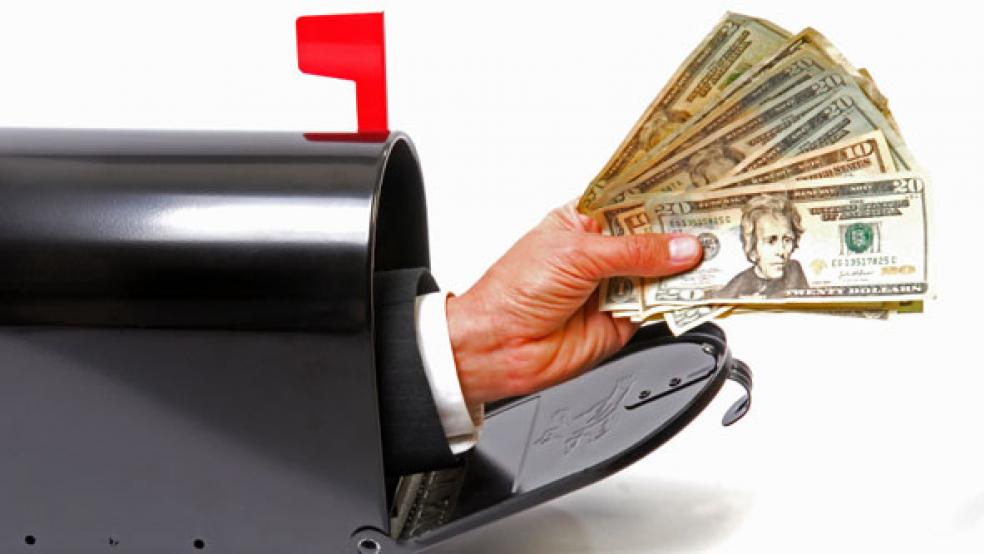This month, the Internal Revenue Service will start sending out income tax refunds totaling hundreds of billions of dollars. But it doesn’t have to. And there is a real argument that if there is any possibility that the Treasury might be unable to pay the nation’s bills by mid-March or sooner, it shouldn’t.
On Monday, Treasury Secretary Jack Lew once again warned Congress that it needs to act quickly to raise the country’s borrowing limit or risk a catastrophic default – but he’s not discussing publicly the option that could buy him extra time, though it would almost certainly create an epic political firestorm.
Related: Business Groups Warn GOP to Drop Debt Ceiling Battle
A little-understood fact about the tax code is that there is no statutory requirement that the Treasury pay out tax refunds by a specific date. The tax code’s only deadline related to refunds relates to interest payments. It requires that if the government holds off paying refunds until 45 days after the filing deadline, it must start paying interest on the money from that day forward. That means that Treasury is under no legal obligation to pay out tax refunds before May 31 – and even that isn’t a deadline, but simply when interest starts to accrue.
In practice, Treasury has made a point of sending tax refund payments out pretty quickly. Many checks and electronic funds transfers go out within days of a return being filed. This is good politics, because nobody likes the idea of the government holding onto money it owes taxpayers. And it’s good economics, as the refunds are a potent economic stimulus. But it may be bad fiscal management for a Treasury Secretary concerned about imminent default.
In remarks delivered at the Bipartisan Policy Center on Monday morning, Lew reminded the audience that the federal debt limit has been suspended through February 7, after which Treasury will be unable to borrow any more money. By deferring certain payments and taking other so-called “extraordinary measures,” Lew estimated that the Treasury will be able to continue meeting the country’s obligations for at least a few more weeks.
But after that, he said “we will be left with only the cash we have on hand and any incoming revenues to meet our country’s commitments. Notably, we expect our outlays over the coming weeks to exceed our net inflows—largely due to the payment of tax refunds—so we will draw down our cash balance faster than at other times of the year. Without borrowing authority, at some point very soon, it would not be possible to meet all of the obligations of the federal government.”
Related: Did Debt Ceiling Fever Break, or Go Into Remission?
So, why would Lew make all those tax payments if he doesn’t have to?
Think of it this way: Nobody would pay their electric bill three months in advance if it meant defaulting on their mortgage this month. Secretary Lew may find himself in a similar position if the debt limit is not raised soon. If Congress were to take the country to the brink of disaster once again and miscalculate on the timing of a final deal – as President Obama publicly fretted during the debt limit crisis of 2011 – Treasury might find itself unable to make a required payment, placing the country in default.
Were that to happen, Lew could face some very difficult questions. Among them: Why did you pay out tax refunds months before you had to, leaving no money to pay obligations coming due much sooner?
The amount of money involved is not trivial. In a letter to House Speaker John Boehner on January 22, Lew pointed out that because of tax refund payments, Treasury’s outlays in February 2013 were $230 billion, compared to an average $45 billion for the other months of the year.
Related: Mitch McConnell Hints at Another Debt Ceiling Showdown
Lew was asked on CNBC last month whether Treasury had considered delaying refund payments to protect the country against possible default, and dodged the question, saying only that the Treasury had never taken that action in the past.
“That's something we've never -- we have not done,” he told host Becky Quick, without actually addressing whether it was an option being considered.
To be sure, delaying tax refund payments would be a monumentally hard sell politically. Many taxpayers count on those payments, using them as a sort of forced-savings account and plan major expenditures around them. Republicans would, no doubt, pounce on such a move.
Experts also warn that, short of shutting down the entire tax return-processing system, it might be logistically impossible to stop refund payments from going out. Treasury’s computer systems are designed to process many payments automatically, especially for electronically-filed tax returns.
But if the choice Lew faces is between making default even a little less likely at the cost of political fallout, and being accused of failing in his fiduciary duty to the United States, it may be no choice at all.
Top Reads from The Fiscal Times:





